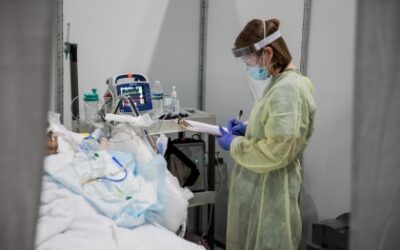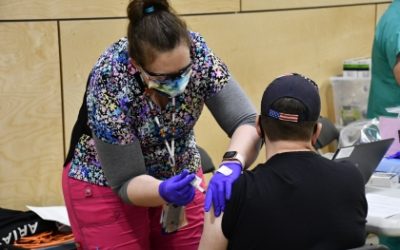The VA has paused any further expansion of its new electronic health record (EHR) in reaction to an early draft of a VA Office of the Inspector General (OIG) report.
Height Might Be a Risk Factor for Several CV Conditions
Height appears to be an unrecognized non-modifiable risk factor for several common conditions in adults, according to a study using data from the VA Million Veteran Program.
Facility Performance Metrics Unavailable With Spokane EHR Rollout
When VA’s new electronic health record (EHR) went live at the Mann-Grandstaff VAMC in October 2020, the system did not have the metrics in place to allow the hospital to measure how the facility was performing, according to a recent study released by the VA Office of the Inspector General.
VA Researcher Focuses on How to Prevent Staff Burnout at VA
For the past five years, Kara Zivin, PhD, MS, MA, has been “chasing burnout,” working to understand what causes it, how to measure it and what are the truly impactful measures that a healthcare system can take to combat it.
VHA National Telestroke Program Uses Technology to Improves Acute Stroke Care
Prompt access to specialized care is critical to limiting the damage caused by a stroke.
Ground-breaking Study in U.S. Military Finds Link Between MS, Epstein-Barr Virus
Researchers with the Uniformed Services University of Health Sciences (USUHS) and the Harvard T.H. Chan School of Public Health appear to have solved one of the most perplexing mysteries in medicine: What causes multiple sclerosis (MS)?
Hormones Affect Sexual Function After AHSCT
How do hormones affect sexual function recovery after autologous hematopoietic stem cell transplantation (AHSCT), which is the standard of care for younger patients with newly diagnosed multiple myeloma.
COVID-19 Pandemic Hits VHA’s MOVE! Weight-Loss Program Hard
The VHA acted quickly to convert its MOVE! Weight Management Program for Veterans to virtual care using telehealth when the COVID-19 pandemic hit in early 2020.
Glitches, Legislative Objections Don’t Stop VA Electronic Record Rollout
VA recently launched its new electronic healthcare record system in a third region, despite evidence of problems with previous deployments and strong objections from legislators and oversight groups.
Million Veteran Program Helps Link Genes for Severe COVID-19, Other Diseases
From the earliest days of the pandemic, it was evident that people with certain medical conditions faced an increased risk of severe COVID-19.
VA AIR Report Outdated Because Pandemic Effects Weren’t Considered
Some of the data which the VA used to support the recommendations made in its Asset and Infrastructure Report (AIR) is outdated and flawed, VA leaders recently admitted.
Treatment Quandary Continues for Non-metastatic Castration-resistant PCa
While most men with non-metastatic prostate cancer respond to androgen-deprivation therapy initially, many later experience rising prostate-specific antigen levels that indicate they have developed castration resistance.
Safety Procedures Aren’t Always Followed at DHA Facilities
Dez Del Barba was only a short way into Army basic training at Fort Benning, GA, when he began to experience escalating pain in both legs. Physicians wrote it off as simple muscle soreness.
Future Employers Might Not Know About Problem Clinicians Fired by VA
A recent investigation by the VA Office of the Inspector General (OIG) found widespread noncompliance by VA facilities in reporting healthcare professionals whose conduct or incompetence led them to be fired to state licensing boards (SLB) or the National Practitioner Data Bank (NPDB).
Adverse Events Predict Cognitive Decline After Brain Stimulation
In a small subset of Parkinson’s disease patients, deep brain stimulation is linked to statistically and clinically significant cognitive declines.
VA Continues Inconsistent Measurement of Veteran Wait Times for Care
On its website, VA regularly reports misleading information on how long it takes for a veteran to be seen at its facilities, according to a recent VA Inspector’s General report. That can lead to confusion among veterans and anyone researching wait times, it added.
VA Leads Nation in Developing Valuation System for Health Care Innovation
The VA introduced a new value-driven framework for evaluating health care innovations in conjunction with the Digital Medicine Society (DiMe) at the Healthcare Information and Management Systems Society (HIMSS) meeting in March.
Public Health Service Bill Seeks to Put Pandemic Lessons to Use
The Senate Health, Education, Labor and Pensions (HELP) Committee recently marked up the PREVENT Pandemics Act—a bipartisan piece of legislation combining ideas from over 37 different bills and dozens of legislators.
EHR Rollout Increased Patient Error Risks, Made Staff Jobs More Difficult
Due to the sheer number of complaints received about VA’s rollout of its new electronic health record (EHR) at the Mann-Grandstaff VAMC, the VA Office of the Inspector General (OIG) initiated two separate, simultaneous inspections into the EHR process.
Gout Associated With Slightly Decreased Risk of Glaucoma in Veterans
How does a history of gout or arthritis due to hyperuricemia affect the development of the ocular neurodegenerative condition glaucoma?
Severe Staffing Shortages Continue to Plague VA Healthcare System
The VA healthcare system currently is grappling with about 50,000 vacancies, mostly among doctors, nurses, social workers and physician aides. In addition, the turnover rate among nurses is the highest the department has experienced since 2005.
Biden Underscores Commitment to Veterans Who Had Toxic Exposures
During the State of the Union address, President Joe Biden shined a light, as he has many times in the past, on the effects of toxic exposure, declaring that he would continue to make it a priority of his administration.
Panel Recommends Closing Some VAMCs, More Emphasis on Outpatient Care
After months of anticipation and years of research, VA has released its Asset and Infrastructure Report (AIR), laying out recommendations for how VA should evolve its physical footprint in the coming decades.
Is VA Doing Enough for Veteran Survivors Seeking Deserved Benefits?
Part of VA’s mission is to care for the widows and orphans of servicemembers and veterans, but some legislators have expressed concern that survivors are getting short shrift, especially when the veteran dies long after their initial service rather than in combat.
VA, House Committee Consider Future of Vet Center Autonomy
As VA looks at the future of its Vet Center program and whether it is meeting current demand, one of its tasks is to find the balance between keeping Vet Centers’ historic autonomy and making sure the department is providing up-to-date care, especially for veterans who are high-risk for suicide and other mental health issues.
Why Do Cataract, TKA Surgeries Often Cost More at VA vs. Outside Care?
New study raises questions about which veterans requiring cataract and total knee replacement surgeries received community care, as opposed to the cases kept within the VA system.
Congressional Leadership Asks VA to Rethink Supply Chain System Plans
Bipartisan congressional leadership is asking that the VA halt its plans to adopt the Defense Logistics Agency’s (DLA’s) supply chain management system.
VA Announces Ambitious Plan to Improve Staff Recruitment, Retention
VA recently unveiled a 10-step human infrastructure plan designed to strengthen the department’s ability to recruit and retain staff.
Brain Stimulation Improves Memory in Veterans with Early Alzheimer’s Disease
Transcranial magnetic stimulation, or TMS, is a technique that uses strong magnetic pulses to stimulate regions of the brain, producing electric currents that may affect neuron activity.
VA Researchers Track COVID-19 Pandemic’s Impact on Healthcare Workers
As the COVID-19 pandemic exploded and Rebecca Hendrickson, MD, PhD, began hearing reports from friends and colleagues who were in the middle of the first waves in New York and Italy, she found their stories all too familiar.










